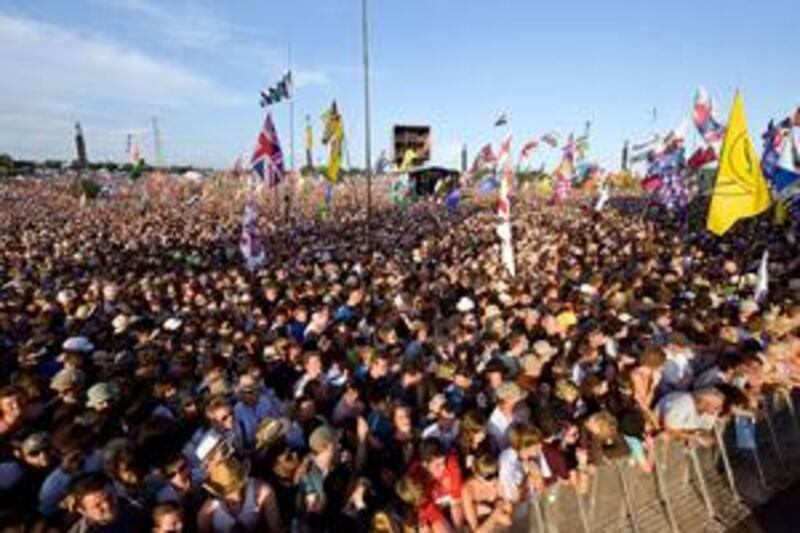This was the year the big headline names were supposed to dominate the festival: the long-awaited Glastonbury debuts of Bruce Springsteen and Neil Young; the return of Blur. Instead, they were claimed by arguably the biggest name of them all. When word of Michael Jackson's death first began to spread around the site late on Thursday night, the day before the opening of the main stages, it was dismissed as mere rumour. There's always a Glastonbury rumour. Last year, attendees were convinced Cliff Richard was no longer with us. Walking around the sprawling food area, the news began to sink in. Reggae Delight eschewed its regular soundtrack in favour of serving up Caribbean fare to the pounding strains of Beat It. The radios of Mexican burrito sellers played Billie Jean; One Day in Your Life rang out from Japanese noodle vendors. People quite literally didn't know whether to dance or cry. Many did both.
But if a background shadow had been set in place for the remainder of the weekend, the immediate forefront was dominated by lightning. And finding shelter and staying on one's feet. The seemingly inevitable Glastonbury equation was taking shape: a valley-set farm in south-west England plus 177,000 pairs of feet equalled rivers of mud, and ground demanding Wellington boots and fierce concentration. The slippery conditions meant that by 9.30 on Friday morning the number of visitors to the medical centre had already broken the 1,000 barrier.
In midafternoon to a chorus of relieved cheers, the rain stopped and the main Pyramid Stage was awash with voices. Fleet Foxes' country-folk harmonies were the sound of angels, and the clouds parted accordingly to offer sunshine. "It's such a pleasure to be terrified in front of you,'' deadpanned the drummer, surveying the vast crowd. When Young's time finally came, he attacked his set like a bare-fisted boxer. As he departed the stage, Young smiled broadly and told onlookers in the wings that he wanted an immediate return next year. A rapturous crowd were left to melt into the night.
The further you move from the main stage areas, the more you taste the flavour that is distinctly Glastonbury. Take Trash City, for example. Nine-metre-high sculptures formed from the twisted remains of scrapped old cars breathed great plumes of fire. Cafes were housed in the sawn-off cabins of airliners. Then it was on to Arcadia and endless labyrinthine avenues hosting bustling curiosity shops and speakeasy bars, an immaculately dressed pianist tinkling away like prohibition never went out of fashion. Beyond there lay the spiritually inclined healing fields and all manner of esoteric suggestions for living a more eco-friendly life. Ultimately, Glastonbury was as far removed from the world as people wanted it to be - it just depended on where you chose to wander. And it is the breadth of what is on offer as much as size that makes Glastonbury's rival festivals seem ordered and static by comparison.
If Friday saw a tentative improvement in the weather, Saturday was glorious beyond all expectation. Shorts and summer dresses reappeared, wet weather boots were discarded in favour of trainers and a collective smile broke out across the site. By lunchtime, the sunshine was blistering. Inspired programming saw Tinariwen provide the perfect Pyramid Stage soundtrack. The enthusiastically received Tuareg visitors dispatched long, slow, hypnotic waves of desert blues, all insistent but unhurried grooves and sun-dried harmonies. They sounded like the African cousins of John Lee Hooker.
"Welcome back Glastonbury, you've missed us,'' announced Derek Smalls, the bass player of the brilliant spoof heavy metal act Spinal Tap. The curl-lipped concentration of a Nigel Tufnel guitar solo remained possibly the most repeatedly funny thing on the planet. They went down a storm. Backstage, England's pop sensation of the moment, Lady Gaga, was encircled by an awkwardly moving, constantly snapping fleet of photographers. Various partners-in-fame looked on in sympathy. On the second main stage, the fellow chart breakthrough Little Boots said: "There was only one song I could play today," before breaking into Michael Jackson's Earth Song. Britain's biggest homegrown rapper, Dizzee Rascal, performed a rapturously received megamix of King of Pop hits. By now, the mood of the site has moved more towards celebrating his life than mourning it.
Three weeks before the event, the father of Glastonbury, Michael Eavis, proudly told me how he'd personally invited Bruce Springsteen via "a personal letter, written all in longhand, no corrections". The human touch paid off. Topping the Saturday night bill he stood in the field below Eavis's farmhouse, dressed in jeans and black T-shirt. He looked impossibly youthful. "Is anybody alive tonight?" he bellowed, having just received the biggest ovation of the weekend. Answerable to a task master like that, it's little wonder the E-Street Band are the best drilled outfit around. Not for nothing is he known as The Boss.
Sunday kicked off lazily with the Easy Star All-Stars' inspired dub-reggae version of The Beatles's Sgt Pepper. The veteran rockers Status Quo looked thrilled to be playing to such a large, youthful crowd, even as their chatter turned to predicting the set list from the evening's headliners, Blur. It turned out that Damon Albarn's serious persona was packed off to bed early. In his place came the lairy, cocky, bouncing Damon, like a child given his first taste of freedom in years. The ovations moved him to tears. ''I'm pleased we decided to do these gigs now,'' he deadpaned after recovering. It is, by a distance, the set of the weekend. As they departed, the far-flung corners readied themselves for the final visitors. And so, even following a festival that took bewildered time out to reflect on the life of a musical master no longer with us, the beat goes on.





